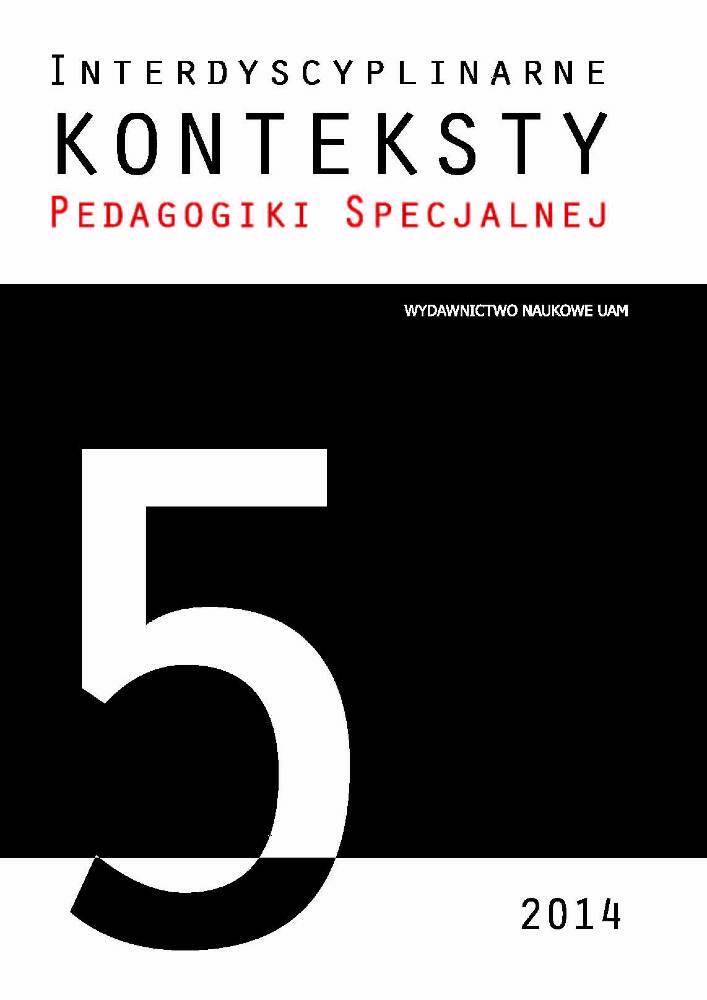Abstrakt
Inclusion of able peers into the process of aiding the development of disabled children is beneficial for both groups. Able children have the opportunity to get to know disabled peers better, to understand them and to develop an accepting attitude toward them. Disabled children have the opportunity to learn that their able peers pay attention to them and are willing to play and talk to them. They also have a chance to experience that they can successfully influence other people. What is more, their autonomy increases since they have to relay more on themselves in interaction with peers. In the article the author analyzes the following issues: 1) theoretical basis of peer tutoring; 2) types of teaching interaction between children; 3) preparing the non-disabled peers for the role of tutors; 4) effectiveness of peer tutoring in teaching children with intellectual disabilities; 5) role of the teacher as an organizer of peer tutoring; 6) questions that require verification by future research. sification of the social issued and different possibilities of its interpretation. An important characteristic of this perspective is also the fact that it points out the need of trying to improve democracy. Like Laclau claims, “the moment of imagining of a desire is maybe more important than its accomplishing, because it is the moment that motivates us to action and initiates the creative thinking”.
Bibliografia
ASHMAN A.F., Peer mediation and students with diverse learning needs, [w:] Co-operative learning. The social and intellectual outcomes of learning in groups, red. R.M. Gillies, A.F. Ashman, Taylor & Francis, New York 2005.
BRINTON B., FUJIKI M., HIGBEE L.M., Participation in cooperative learning activities by children with specific language impairment, „Journal of Speech, Language and Hearing Research”, 1998, nr 5.
BRUNER J.S., W poszukiwaniu teorii nauczania, Państwowy Instytut Wydawniczy, Warszawa 1974.
CARTER E.W., CUSHING L.S., KENNEDY C.H., Peer support strategies: improving all student’s social lives and learning, Paul H. Brookes, Baltimore 2009.
Children helping children, red. H.C. Foot, M.J. Morgan, R.H. Shute, John Willey & Sons, New York 1990.
COOPER C.R., Development of collaborative problem-solving among preschool children, „Developmental Psychology”, 1980, nr 5.
CUSHING L.S., KENNEDY C.H., Academic effect of providing peer support in general educa-tion classrooms on students without disabilities, „Journal of Applied Behavior Analysis”, 1997, nr 1.
DAMOND W., PHELPS E., Strategies uses of peer learning in children’s education, [w:] Peer relationships in child development, red. T.J. Berndt, G.W. Ladd, John Willey & Sons, New York 1989.
DOISE W., The development of individual competencies through social interaction, [w:] Children helping children, red. H.C. Foot, J.M. Morgan, R.H. Shute, John Wiley & Sons, New York 1990.
FISHER J.B., SHUMAKER J.B., DESHLER D.D., Searching for validated inclusive practices: A review of literature, „Focus on Exceptional Children”, 1995, nr 4.
FONTANA D., Where do we go from here? A personal view by an educationalist, [w:] Chil-dren helping children, red. H.C. Foot, M.J. Morgan, R.H. Shute, John Willey & Sons, New York 1990.
GOLDSTEIN H., WICKSTROM S., Peer intervention effect on communicative interaction among handicapped and nonhandicapped preschoolers, „Journal of Applied Beha-
vior Analysis”, 1986, nr 2.
GRAUVOGEL-MACALEESE A.N., WALLACE M.D., Use of peer-mediated intervention in children with attention deficit hyperactivity disorder, „Journal of Applied Behavior Analysis”, 2010, nr 3.
GURALNICK M.J., Peer interactions and development of handicapped children’s social and communicative competence, [w:] Children helping children, red. H.C. Foot, M.J. Morgan, R.H. Shute, John Wiley & Sons, New York 1990.
GUT D.M., We are social beings learning how to learn cooperatively, „Teaching Exceptional Children”, 2000, nr 4.
HUNT P., ALWELL M., GOETZ L., SAILOR W., Generalized effects of conversational skills training, „Journal of the Association for Severely Handicapped”, 1990, nr 4.
HUNT P., GOETZ L., ALWELL M., SAILOR W., Using an interrupted behavior chain strate-gy to teach generalized communication responses to students with severe disabilities, „The Journal of The Association for Persons with Severe Handicaps”, 1988, nr 3.
JENKINS J.R., ANTIL L.R., WAYNE S.K., VADASY P.F., How cooperative learning works for special education and remedial students, „Exceptional Children”, 2003, nr 3.
JOHNSON D.W., JOHNSON R.T., Learning together and alone: cooperative, competitive and individualistic learning, Allyn & Bacon, Boston 1994.
MURPHY E., GREY I.M., HONAN R., Co-operative learning for students with difficulties in learning: a description of model and guidelines for implementation, „British Journal of Special Education”, 2005, nr 3.
O’CONNOR R.E., JENKINS J.R., Cooperative learning as an inclusion strategy: a closer look, „Exceptionality”, 1996, nr 1.
PUTNAM J., MARKOVCHICK K., JOHNSON D.W., JOHNSON R.T., Cooperative learning and peer acceptance of students with learning disabilities, „Journal of Social Psycho¬logy”, 1996, nr 6.
SLAVIN R.E., Cooperative learning. Theory, research and practice, Allyn & Bacon, Boston 1995.
SMITH T., Making inclusion work for students with autism spectrum disorders, Guilford Press, New York 2012.
STRAIN Ph.S., SHORES R.E, TIMM M.A., Effects of peer social initiations on the behavior of withdrawn preschool children, „Journal of Applied Behavior Analysis”, 1977, nr 2.
TATEYAMA-SNIEZEK K.M., Cooperative learning: does it improve the academic achievement of students with handicaps?, „Exceptional Children”, 1990, nr 5.
TUDGE J., ROGOFF B., Wpływ rówieśników na rozwój poznawczy – podejście Piageta i Wygotskiego, [w:] Dziecko wśród rówieśników i dorosłych, red. A. Brzezińska,
G. Lutomski, B. Smykowski, Wydawnictwo Zysk i S-ka, Poznań 1995.
TWARDOWSKI A., Rola pełnosprawnych rówieśników w procesie wspomagania rozwoju dzieci niepełnosprawnych, [w:] Wspomaganie rozwoju i rehabilitacja dzieci z genetycz-nie uwarunkowanymi zespołami zaburzeń, red. idem, Wydawnictwo Naukowe PTP, Poznań 2004.
TWARDOWSKI A., Wpływ nauczających relacji z pełnosprawnymi rówieśnikami na rozwój dzieci z niepełnosprawnościami, [w:] Pedagogika specjalna – koncepcje i rzeczywistość. Socjopedagogiczne aspekty rehabilitacji osób niepełnosprawnych, red. T. Żółkowska, M. Wlazło, ZAPOL, Szczecin 2008.
WYGOTSKI L.S., Wybrane prace psychologiczne, PWN, Warszawa 1971.
